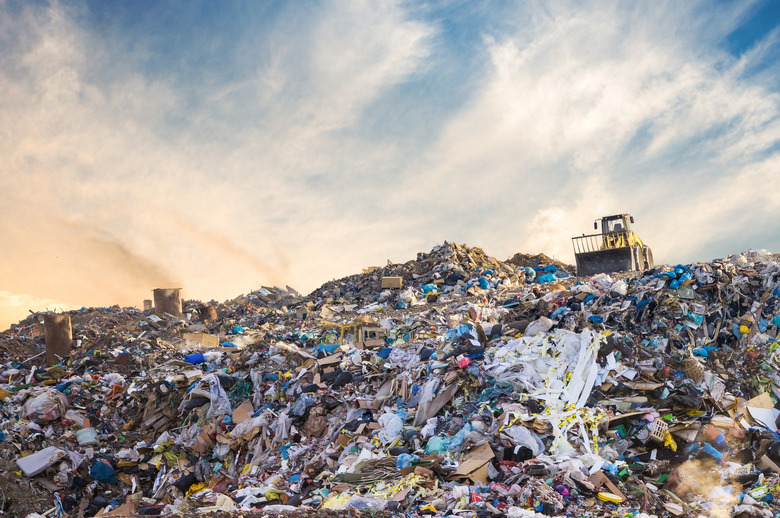Hazardous Waste Landfill Advantages & Disadvantages
Before landfills existed, people disposed of waste in open dumps. It wasn't until the 1930s when people in the United States began to put their waste into holes in the ground. Today, you know those holes as landfills. Landfills can hold a variety of different waste types including materials that are hazardous. Although there are advantages to using landfills to hold hazardous waste, a few disadvantages exist that could pose problems.
Landfill Types
Landfill Types
Because different types of waste products exist, you'll find different types of landfills. The Environmental Protection Agency requires different handling methods for specific waste types. Industrial landfills, for example, process waste that industries produce. Landfill operators obtain licenses that permit them to handle a specific waste type. All hazardous waste must go into a CCRA Subtitle C landfill. Regular municipal waste, on the other hand, goes into "RCRA Subtitle D" landfills.
Hazardous Landfill Advantages
Hazardous Landfill Advantages
RCRA stands for Resource Conservation Recovery Act. This act has several subtitles such as Subtitle C, the one that deals with hazardous waste disposal. These types of landfills are beneficial because they ensure that hazardous waste materials receive appropriate storage and treatment in a way that protects the environment and human health. Operators cannot put liquid hazardous waste into a hazardous waste landfill; they can only accept solid waste material.
Hazardous Landfill Disadvantages
Hazardous Landfill Disadvantages
Well-designed hazardous waste sites have protective seals to keep hazardous chemicals from escaping into the ground. However, if a leak occurs, hazardous chemicals can contaminate groundwater in the region. Landfills can also emit harmful gases into the atmosphere. Newer landfills have the ability to capture those gases and transform them into energy. Hazardous waste landfill operators seal their facilities with double liners and use other methods to keep hazardous materials from escaping into the environment.
Managing Hazardous Household Wastes
Managing Hazardous Household Wastes
You may use household products that can harm the environment if you don't dispose of them properly. These products may include paint, oil and cleansers. The EPA asks people not to dump these products on the ground or pour them down the drain. Doing that could produce an environmental hazard that could harm others. Ask your local health, environmental or waste agency for information about safe ways to manage and dispose of hazardous household waste.
Cite This Article
MLA
Lee, Kevin. "Hazardous Waste Landfill Advantages & Disadvantages" sciencing.com, https://www.sciencing.com/hazardous-waste-landfill-advantages-disadvantages-23695/. 13 March 2018.
APA
Lee, Kevin. (2018, March 13). Hazardous Waste Landfill Advantages & Disadvantages. sciencing.com. Retrieved from https://www.sciencing.com/hazardous-waste-landfill-advantages-disadvantages-23695/
Chicago
Lee, Kevin. Hazardous Waste Landfill Advantages & Disadvantages last modified August 30, 2022. https://www.sciencing.com/hazardous-waste-landfill-advantages-disadvantages-23695/
